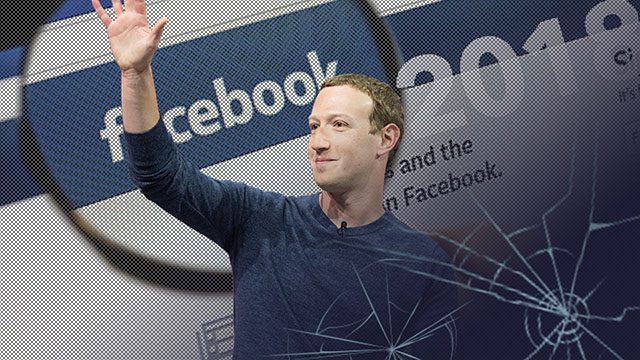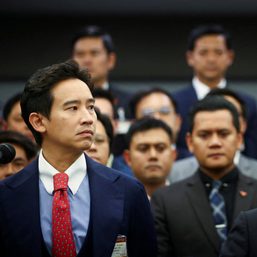SUMMARY
This is AI generated summarization, which may have errors. For context, always refer to the full article.

At the start of 2018, Facebook CEO Mark Zuckeberg made it his resolution to “fix” the social network.
“The world feels anxious and divided, and Facebook has a lot of work to do,” Zuckerberg wrote.
He promised to tackle the social network’s problems, which included abuse, cyberbullying, and hatred, as well as interference by nation states in the functioning of other countries.
“My personal challenge for 2018 is to focus on fixing these important issues,” he said.
2018 was a year of tumult for the social network, 365 days in which Zuckerberg’s now-complex yearly resolutions were not met.
Below is an overview of Facebook’s past year.
The shifting news feed
Facebook started off the year with changes to the news feed that would attempt to focus on friends over news. The changes were meant to allow users to focus on relationships with people rather than with the news cycle.
The changes were expected to make people spend less time on Facebook and the social network did take a hit from the changes – to the tune of nearly $25 billion in market capitalization, according to Business Insider.
Cambridge Analytica
In March, the Cambridge Analytica data scandal occurred. The personal data of up to 87 million users was improperly shared with British political consultancy Cambridge Analytica and may have been used to influence public opinion.
Facebook took on fines and public scrutiny following the scandal.
The Facebook hearings
In April, Zuckerberg faced two panels: a US Senate panel hearing on data privacy and a second panel with the US House of Representatives committee on energy and commerce.
During the panels, Zuckerberg apologized as best he could for the data scandal.
Said Zuckerberg, “It’s clear now that we didn’t do enough to prevent these tools from being used for harm. That goes for fake news, foreign interference in elections, and hate speech, as well as developers and data privacy.”
Zuckerberg promised other applications were also being investigated to determine if they did anything wrong given the scope of the scandal.
He added his personal information was also affected as part of the Cambridge Analytica data leak.
Election influencers
Across July and August, Facebook was in the news for its attempts to stamp out campaigns to influence elections in various parts of the world.
In July, Facebook removed 32 pages suspected of stoking hot-button issues likely of Russian origin.
In August, the social network removed another 650 pages identified as “networks of accounts misleading people about what they were doing,” according to Mark Zuckerberg.
The pages were linked not only to Russia, but to Iran state-owned entities as well, with behavior strategically similar to the Russian campaigns.
In September Facebook Chief Operating Officer Sheryl Sandberg, alongside Twitter CEO Jack Dorsey, stepped up to the plate to give their own testimony to the US Senate, in part to tackle the issue of election influencing and interference in the US.
The security breach
In October, Facebook admitted a breach – which occurred in September and bade Facebook to forcibly log out some 50 million users – affected 29 million accounts.
The attackers accessed the names, phone numbers and email addresses of 15 million users, and for another 14 million people additional information – including gender, religion, hometown, birth date and places they had recently “checked in” to as visiting – were also accessed.
Discrediting critics
Facebook also dealt with another controversy in November, this time over its use of a PR firm to attack the social network’s critics.
Facebook hired a conservative consulting firm, Definers, to diversify its advisors in Washington, but the role of Definers expanded, with one task being looking into Facebook’s competitors and researching George Soros.
Facebook’s outgoing communications chief, Elliot Schrage, took the heat for the scandal.
Additionally, a piece made by The New York Times said Facebook misled the public regarding its knowledge of Russian election meddling. It also said it used a PR firm to spread negative stories about other Silicon Valley companies to deflect anger from itself.
Executives bid their leave
Across 2018, at least 10 executives from Facebook or Facebook-owned companies left the company.
Jan Koum, the co-founder of WhatsApp, left in late April. Kevin Systrom and Mike Krieger, the co-founders of Instagram, made their exit in September.
Meanwhile, Oculus co-founder Brendan Iribe left in October.
Additionally, the following Facebook executives left during the year:
- Elliot Schrage, head of communications and public policy
- Colin Stretch, Facebook’s top lawyer
- Alex Stamos, chief security officer
- Dan Rose, vice president of partnership
- Rachel Whetstone, one of the company’s top communications executives
- Alex Hardiman, head of news products
2018 was not a good year for Facebook. Despite this, Facebook CEO Zuckerberg took the time to, as he put it, be “proud of the rest of the progress we’ve made this year.”
He also did not formally state a 2019 resolution, but rather promised to keep working on the unfinished business of 2018.
“Addressing these issues is more than a one-year challenge,” Zuckerberg wrote, outlining the ways in Facebook has changed for the better.
The question is, has Facebook really changed for the better in the long-term?
More importantly, will 2019 have anything good in store of the many Facebook users out there who use the social network out of necessity rather than love? – Rappler.com
Add a comment
How does this make you feel?





There are no comments yet. Add your comment to start the conversation.